#mississippi
Text
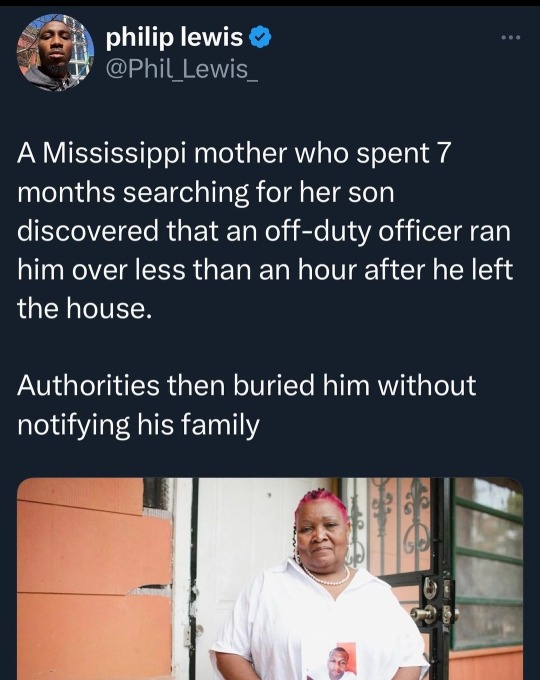
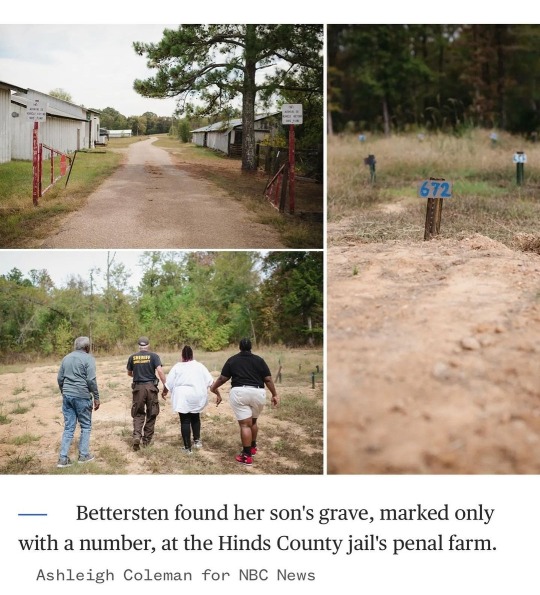
Defund and abolish is making more and more sense. End qualified immunity for police, too.
How many more are buried there?!!!
14K notes
·
View notes
Text

5K notes
·
View notes
Text

—Mississippi Masala (1991)
2K notes
·
View notes
Text

1st St, Meridian, Mississippi.
741 notes
·
View notes
Text
A Black woman in Mississippi reported her son missing and went 7 months with police telling her they couldn’t find him.
She sent them photos, begged for updates, and implored them to put his story on the news.
It turns out they knew where he was all along. An hour after he left his house he was struck and killed on the highway by an off duty police officer.
They hid his body in the morgue for months without ever notifying his family despite there being a prescription bottle with his name on it found at the scene.
Then they buried him in a pauper’s field with nothing but a number identifying him as corpse # “672”.
917 notes
·
View notes
Text

"Charles killed my favorite child the other day" may be the single greatest phrase I've ever read in a Dear Santa letter.
(source: The Jackson Daily News World, December 20, 1916.)
#true crime#1910s#history#christmas#kids#mississippi#murder#dolls#I have been randomly quoting this letter for the last month
629 notes
·
View notes
Text
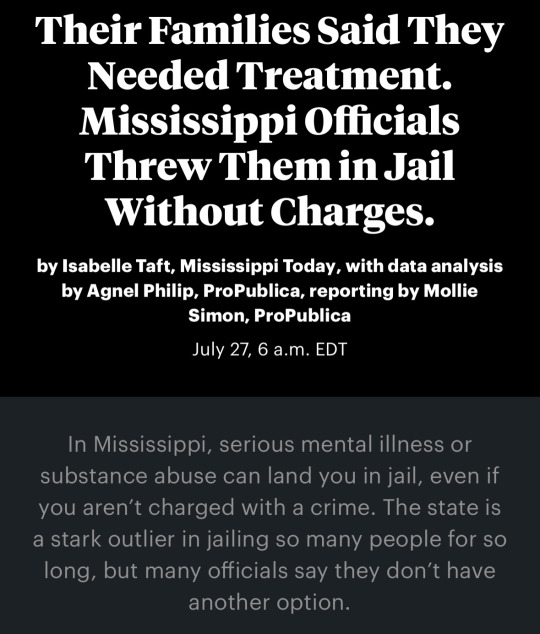

Source
#criminal justice system#racism#prisons#abolish prisons#news#current events#government#mental health#substance abuse treatment#Mississippi
1K notes
·
View notes
Text
A Mississippi chicken slaughterhouse put a child into a 'preventable, dangerous situation', the Labor Department has concluded - after the death of a 16-year-old sucked into a chicken deboning plant.
Duvan Perez had been cleaning equipment at the Hattiesburg plant of Mar-Jac Poultry on July 14, 2023, when he was pulled into the rotating shaft of a machine and sustained fatal injuries.
Perez, originally from Guatemala, had been hired to work at the slaughterhouse by a recruitment firm - despite it being illegal for under 18s to work at a meat processing plant.
His death caused widespread outrage, and on Wednesday the Occupational Safety and Health Administration (OSHA) - a division of the Department of Labor - issued their report, finding a litany of errors and recommending $212,646 in penalties.
They also highlighted two previous deaths at the company's facilities since 2020, and accused the company of complacency and recklessness.
#news#us news#us pol#uspol#mississippi#mississippi news#hattiesburg#hattiesburg mississippi#child labor#teen labor#OSHA#mar-jac poultry
666 notes
·
View notes
Photo
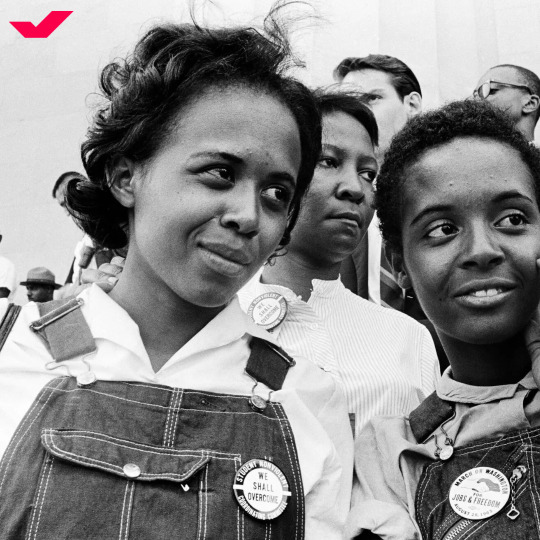

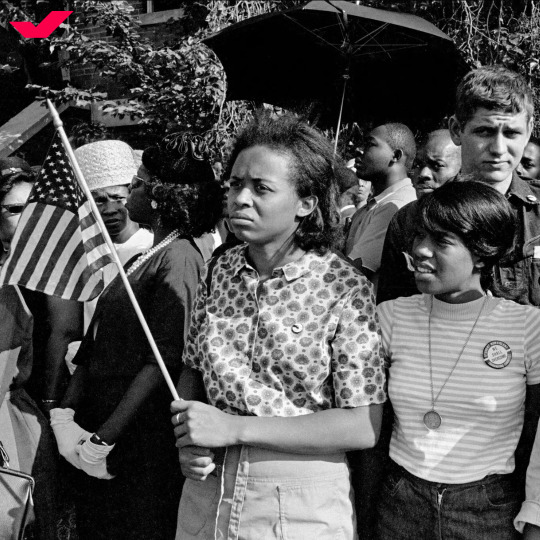
We are saddened to hear about the passing of Dorie Ann Ladner, lifelong voting rights activist. 🕊️🗳️
Ms. Ladner participated in every major civil rights protest of the 1960s, including the March on Washington and the march from Selma to Montgomery, Alabama. She was a key organizer in her home state of Mississippi, with contributions to the NAACP and Student Nonviolent Coordinating Committee. In June 1964, she launched a volunteer campaign called “Mississippi Freedom Summer,” with a goal of registering as many Black voters as possible.
We remember and honor Dorie through the words of her sister and fellow activist, Joyce Ladner: as someone who “fought tenaciously for the underdog and the dispossessed,” and “left a profound legacy of service.”
#dorie ladner#dorie ann ladner#voting rights#civil rights#women's history month#mississippi#naacp#sncc#student nonviolent coordinating committee#black voters#black voter#activist#1960s
331 notes
·
View notes
Text

2K notes
·
View notes
Text
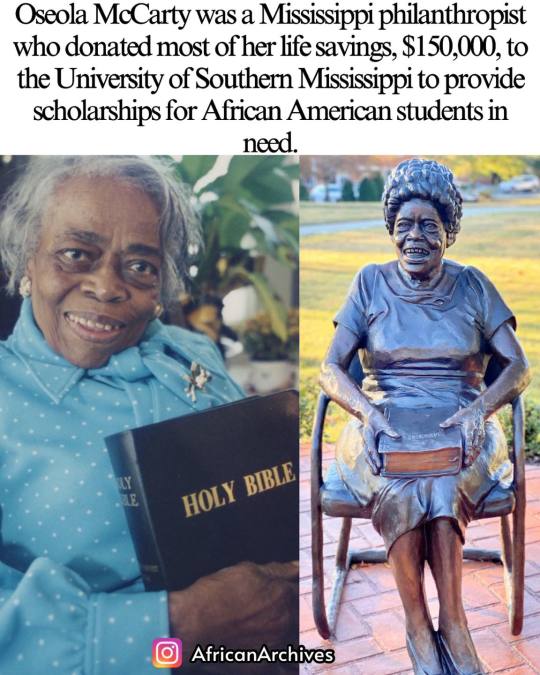
McCarty was born on March 7, 1908, in Shubuta, Mississippi. She was raised in nearby Hattiesburg by her aunt and grandmother. McCarty, who never married and had no children, lived frugally in a house without air conditioning. She never had a car or learned to drive, so she walked everywhere, including the grocery store that was one mile from her home.
When she was 8 years old, McCarty opened a savings account at a bank in Hattiesburg and began depositing the coins she earned from her laundry work. She would eventually open accounts in several local banks. By the time McCarty retired at age 86, her hands crippled by arthritis, she had saved $280,000. She set aside a pension for herself to live on, a donation to her church, and small inheritances for three of her relatives. The remainder—$150,000—she donated to the University of Southern Mississippi, a school that had remained all-white until the 1960s. McCarty stipulated that her gift be used for scholarships for Black students from southern Mississippi who otherwise would not be able to enroll in college due to financial hardship. Business leaders in Hattiesburg matched her bequest and hundreds of additional donations poured in from around the country, bringing the total endowment to nearly half a million dollars.
The first beneficiary of McCarty’s largesse was Stephanie Bullock, an 18-year-old honors student from Hattiesburg, who received a $1,000 scholarship. Bullock subsequently visited McCarty regularly and drove her around town on errands.
In 1998 the University awarded McCarty an honorary degree. She received an honorary doctorate from Harvard University, and President Bill Clinton awarded her the Presidential Citizens Medal.
McCarty died of liver cancer on September 26, 1999, at the age of 91. In 2019 McCarty’s home was moved to Hattiesburg’s Sixth Street Museum District and turned into a museum.
x
#oseola mccarty#philanthropist#university of southern mississippi#scholarship#black students#financial hardship#hattiesburg#mississippi#honorary degree#harvard university#presidential citizens medal#sixth street museum district#women's history month#history#black history
341 notes
·
View notes
Text

Oleander Dr, Gulfport, Mississippi.
266 notes
·
View notes
Text

POV: “Prettiest of them all”…….🪞🪞🪞
#sexy content#sexy breast#sexy pose#daddy's good girl#hot as fuck#hot babygirl#mississippi#curvy body#amazing body#beauty#the bad batch#daddy’s babygirl#baby gurl#so hot and sexy#so hot 🔥🔥🔥
148 notes
·
View notes
Text
Ian Millhiser at Vox:
The Supreme Court announced on Monday that it will not hear Mckesson v. Doe. The decision not to hear Mckesson leaves in place a lower court decision that effectively eliminated the right to organize a mass protest in the states of Louisiana, Mississippi, and Texas.
Under that lower court decision, a protest organizer faces potentially ruinous financial consequences if a single attendee at a mass protest commits an illegal act.
It is possible that this outcome will be temporary. The Court did not embrace the United States Court of Appeals for the Fifth Circuit’s decision attacking the First Amendment right to protest, but it did not reverse it either. That means that, at least for now, the Fifth Circuit’s decision is the law in much of the American South.
For the past several years, the Fifth Circuit has engaged in a crusade against DeRay Mckesson, a prominent figure within the Black Lives Matter movement who organized a protest near a Baton Rouge police station in 2016.
The facts of the Mckesson case are, unfortunately, quite tragic. Mckesson helped organize the Baton Rouge protest following the fatal police shooting of Alton Sterling. During that protest, an unknown individual threw a rock or similar object at a police officer, the plaintiff in the Mckesson case who is identified only as “Officer John Doe.” Sadly, the officer was struck in the face and, according to one court, suffered “injuries to his teeth, jaw, brain, and head.”
Everyone agrees that this rock was not thrown by Mckesson, however. And the Supreme Court held in NAACP v. Claiborne Hardware (1982) that protest leaders cannot be held liable for the violent actions of a protest participant, absent unusual circumstances that are not present in the Mckesson case — such as if Mckesson had “authorized, directed, or ratified” the decision to throw the rock.
Indeed, as Justice Sonia Sotomayor points out in a brief opinion accompanying the Court’s decision not to hear Mckesson, the Court recently reaffirmed the strong First Amendment protections enjoyed by people like Mckesson in Counterman v. Colorado (2023). That decision held that the First Amendment “precludes punishment” for inciting violent action “unless the speaker’s words were ‘intended’ (not just likely) to produce imminent disorder.”
The reason Claiborne protects protest organizers should be obvious. No one who organizes a mass event attended by thousands of people can possibly control the actions of all those attendees, regardless of whether the event is a political protest, a music concert, or the Super Bowl. So, if protest organizers can be sanctioned for the illegal action of any protest attendee, no one in their right mind would ever organize a political protest again.
Indeed, as Fifth Circuit Judge Don Willett, who dissented from his court’s Mckesson decision, warned in one of his dissents, his court’s decision would make protest organizers liable for “the unlawful acts of counter-protesters and agitators.” So, under the Fifth Circuit’s rule, a Ku Klux Klansman could sabotage the Black Lives Matter movement simply by showing up at its protests and throwing stones.
The Fifth Circuit’s Mckesson decision is obviously wrong
Like Mckesson, Claiborne involved a racial justice protest that included some violent participants. In the mid-1960s, the NAACP launched a boycott of white merchants in Claiborne County, Mississippi. At least according to the state supreme court, some participants in this boycott “engaged in acts of physical force and violence against the persons and property of certain customers and prospective customers” of these white businesses.
Indeed, one of the organizers of this boycott did far more to encourage violence than Mckesson is accused of in his case. Charles Evers, a local NAACP leader, allegedly said in a speech to boycott supporters that “if we catch any of you going in any of them racist stores, we’re gonna break your damn neck.”
With SCOTUS refusing to take up McKesson v. Doe, the 5th Circuit's insane anti-1st Amendment ruling that effectively bans mass protests remains in force for the 3 states covered in the 5th: Texas, Louisiana, and Mississippi.
#SCOTUS#Deray McKesson#Protests#Black Lives Matter#5th Circuit Court#Texas#Louisiana#Mississippi#1st Amendment#Counterman v. Colorado#NAACP v. Claiborne Hardware#McKesson v. Doe
219 notes
·
View notes
Text

Sharkheads, Biloxi, Mississippi, 1973
361 notes
·
View notes
Text
One anti-furry bill died, the other two wait to be heard
(This blog post was originally posted on the Otherkin News blog on DreamWidth by Orion Scribner on March 24, 2024.)
Content warnings: Rated G. An urban legend that describes an unsanitary situation. Sexism against transgender people, including attempts to prevent them from going to school or using facilities, and outing children to their parents. A straw-man version of furries being used to try to discredit transgender people, in a way that could cause trouble for people who identify as nonhuman.
So far this year, Republicans have proposed three pieces of legislation that are opposed to furries or people who identify as nonhuman. That’s something they started doing last year, inspired by an urban legend about litter boxes in public schools, which they made up in parody of transgender students asking to use school restrooms. We’ve been ending up calling these “anti-furry bills” as we keep track of them in our Otherkin News blog. Furry isn’t the accurate word, but it is the word that Republicans use in the urban legend and usually in the bills too. Every once in a while, I’m checking on the status of the bills, and trying to see if there are any new ones. Here is the update for this week.
1. Oklahoma House Bill 3084 (OK HB 3084) “Schools; prohibiting certain students from participating in school curriculum or activities; effective date.”
Background: We wrote about this bill in detail in a previous Otherkin News post. The bill says that furry students should be taken out of school by animal control. Its only sponsor (writer) is Justin Humphrey (he/him). This seems linked with his opposition to LGBTQ people, as well as his efforts to legalize animal fighting. Later, Jim Olsen (he/him) took over as principal sponsor of the bill. He proposed changing it to have the same text as an unrelated bill of his, one requiring public school classrooms to display the Ten Commandments.
Update: The bill’s current status hasn’t changed since our last update. It’s still at 25% progression toward becoming a law. Its text hasn’t changed from what it was originally, so it's still about furries.
2. Mississippi House Bill 176 (MS HB 176) “Gender dysphoria; require school personnel to notify parents of student who request to be referred to as different gender or nonhuman.”
Background: This was introduced at the same time as the first bill. As we previously wrote about it, the bill is mostly against transgender students in a way that could put them in real danger. It would require schools to out transgender students to parents, and to allow faculty to not accommodate any student who “identif[ies] at school as a gender or pronoun that does not align with the child's sex on their birth certificate, other official records, sex assigned at birth, or identifying as an animal species, extraterrestrial being or inanimate object.”
Update: This bill’s current status is dead! Hooray! It died in committee on March 3. When a bill dies, that means that it won’t progress toward becoming a law.
3. Missouri House Bill 2678 (MO HB 2678) “Prohibits students from engaging in ‘furry’ behavior while at school”
Background: We previously wrote about this bill. The bill says to pull students out of school for being furries or purporting to be animals. The bill’s only sponsor is Cheri Toalson Reisch (she/her). This appears to be connected with her opposition to transgender people as well as her efforts to undermine public schools in favor of charter schools.
Updates: This bill hasn’t changed or moved forward. It’s still the same as it was when it was introduced. A hearing hasn’t been scheduled for it, and it’s not on a House calendar.
-
About the writer: This blog post was written by Orion Scribner (they/them), who has been a community historian and archivist for more than ten years.
#litterbox hoax#litter box hoax#litter box urban legend#furry#otherkin#therianthrope#nonhuman#US politics#OK HB 3084#Oklahoma#transphobia#Mississippi#Missouri#MS HB 176#MO HB 2678#sexism#Otherkin News#rated G#unsanitary
159 notes
·
View notes